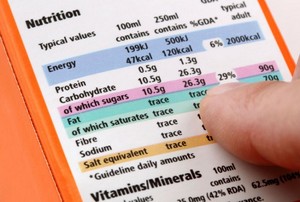 Brett Smith for redOrbit.com – Your Universe Online
Brett Smith for redOrbit.com – Your Universe Online
While adding salt, sugar and fat can make any food highly craveable, an excess intake of these food elements can cause a variety of diseases – from hypertension to diabetes.
Health officials around the world have been sounding the alarm with respect to excess salt, sugar and fat intake and one organization within the European Union, called Terifiq, is currently pursuing research endeavors aimed at cutting their use in processed foods.
“The challenge is to find solutions which combine reduction objectives as defined by WHO, technological feasibility at an industrial scale, and preservation of sensory and nutritional properties of the products,” explained Terifiq coordinator Christian Salles, a food expert at the National Institute for Agricultural Research (INRA) in Dijon, France.
Jean-Michel Lecerf, head of the Nutrition department at the Pasteur Institute in Lille, France, told non-profit media agency youris.com that the food projects are important, but ultimately consumers must want change.
“The objectives of Terifiq are relevant, but it can only be effective if consumers change their habits in terms of alimentary choices and intake,” Lecerf said. “Such programs must be carried out alongside prevention policies of nutrition-related diseases.”
Terifiq scientists are using a variety of approaches to reach their goals, often with limited success. For example, reducing the amount salt in cheese can be tricky, since unwanted pathogens may flourish if the concentration of it is too low.
An approach being used is to try to fool the senses into not noticing a change that has been made to a familiar food item. One solution, for example, involves spraying a very thin powder of salt onto potato chips. The taste and sensation in the mouth are said to be the same, but can be achieved using less salt than conventional methods. Project scientists have used a similar approach for fat called cryo-crystallization, which involves evenly spraying frozen fat onto a product.
“So far, it hasn’t (worked),” Salles said, adding, “this technology is very expensive.”
Terifiq scientists are also attempting to find healthier sugar substitutes, like the leaves of the Stevia plant.
“Replacement can lead to undesirable flavors, requesting the use of masking chemical agents to hide them,” said José Manuel Barat Baviera, head of the Food technology department at the Polytechnic University of Valencia in Spain. “As salt interacts with aromas, replacement modifies the sensory perception of the product. So, it is very difficult to keep the original taste of the product unchanged.”
Another EU endeavor is seeking to make healthy supplements for processed food from waste products taken from meat processing facilities. As part of the EU-funded PROSPARE project, scientists are using enzymes to digest production leftovers such as bone and meat trimmings, converting them into proteins called functional animal proteins hydrolyzates. These proteins have a higher concentration of nutritionally-valuable amino acids.
In addition to being an important effort in the fight against chronic disease, the PROSPARE project would utilize the approximately 50 percent of animal weight currently being discarded by the meat processing industry. Unsuccessful efforts have already been made to convert this waste into biodiesel.
 Dzobak Volodymyr
РОЗДУМИ ПРО НАДВАЖЛИВЕ або ЧОМУ НАШІ ОЛІГАРХИ СТАЛИ МОГИЛЬЩИКАМИ НИНІШНЬОЇ УКРАЇНИ
Dzobak Volodymyr
РОЗДУМИ ПРО НАДВАЖЛИВЕ або ЧОМУ НАШІ ОЛІГАРХИ СТАЛИ МОГИЛЬЩИКАМИ НИНІШНЬОЇ УКРАЇНИ




 Brett Smith for redOrbit.com – Your Universe Online
Brett Smith for redOrbit.com – Your Universe Online